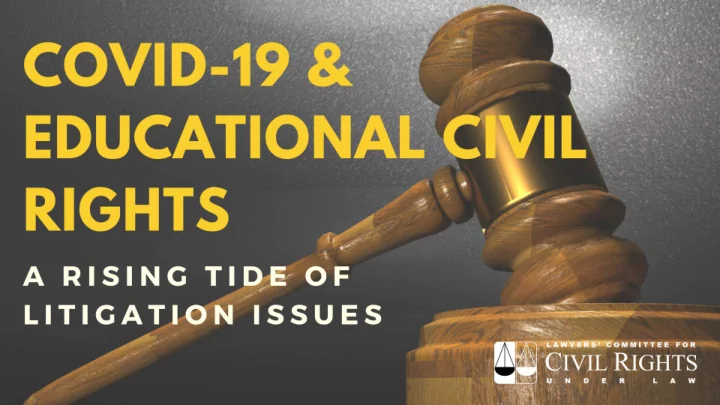

COVID-19 & Educational Civil Rights
COVID-19 & Educational Civil Rights https://projects.propublica.org/graphics/desegregation-orders
Continuing obligations in desegregation cases • Until it is released from the desegregation order, school districts must work to abolish “the system of segregation and its effects” so that racial discrimination in public education is eliminated “root and branch.” Green v. Kent Cty. Sch. Bd. , 391 U.S. 430, 438, 440 (1968). • • Actions by school districts that have a racially discriminatory effect may violate the desegregation order, regardless of the intent of school administrators.
Continuing obligations in desegregation cases • Just as the District could not close all public schools, but continue to offer educational services to white, but not Black students, Griffin v. Prince Edward Cty. Sch. Bd. , 377 U.S. 218, 231-32 (1964); • Nor could the District provide more educational resources to predominately white, but not predominately Black schools, Price v. Denison Indep. Sch. Dist. , 694 F.2d 334, 370-71 (5th Cir. 1982); • So too do desegregation orders bar districts from adopting policies, like online- only programs, that result in starkly unequal access to educational opportunities
Continuing obligations in desegregation cases • Where a school district takes actions that “greatly reduce[ ]” the number of Black students able to obtain school meals, it is “reasonable” for a federal court to order a district to “reinstitute a school lunch program similar” to its prior program. • Plaquemines Par. Sch. Bd. v. United States , 415 F.2d 817, 830-32 (5th Cir. 1969)
LDF Advocacy • Sent letters to every district where LDF has active school desegregation litigation • Sent letter and spoke with the Louisiana Governor and State Superintendent about school district’s continuing desegregation obligations • Tracking racial equity in two primary areas • Educational services (digital divide, technology access, distance learning, methods of delivery) • Meal Services (distribution, delivery, etc.)
Why Food Services? • Research released Wednesday shows a rise in food insecurity without modern precedent. Nearly a fifth of young children are not getting enough to eat, according to surveys of their mothers by the Brookings Institution. The rate is three times higher than in 2008, at the worst of the Great Recession. • When food runs short, parents often skip meals to keep children fed. But a survey of households with children 12 and under by Lauren Bauer, a Brookings fellow in economic studies, found that 17.4 percent reported the children themselves were not eating enough, compared with 5.7 percent during the Great Recession. • Inadequate nutrition can leave young children with permanent developmental damage. https://www.nytimes.com/2020/05/06/us/coronavirus-live-updates.html
Leeds City Schools • Leeds Alabama • March 13: Alabama closed schools • March 16 to April 3: Leeds provided Grab and Go meals • April 3: Alabama Stay at Home Order, exempted schools • April 3: Leeds stopped Grab and Go program • Week of April 6: LDF Correspondence with Leeds • April 15: Emergency Motion for Further Relief • April 16 & 17: Hearing before federal Judge • April 21: Resumed Meal Program
Leeds City Schools • District Court ruling on consent order: • “T he Court concludes and is satisfied that the following agreed remedial measures are reasonable, necessary, and consistent with the Court’s authority to enforce the desegregation order. See Griffin v. Sch. Bd. of Prince Cty., 377 U.S. 218, 231 (1964); Plaquemines Par. Sch. Bd. v. United States , 415 F.2d 817, 832 (5th Cir. 1969)”
St. Martin Parish, La Schools • While recognizing the novelty of this issue and the short amount of time the parties had to address the Court’s concerns in this area, the Court felt it lacked adequate information to reach a decision on its authority to act. • The Court noted, however, that “it did not seem to be a far stretch to conclude that the consent decree in this matter allowed action based on the language in the [desegregation] decree.”
Deuel Ross NAACP LDF (212) 965-7712 dross@naacpldf.org
Recommend
More recommend